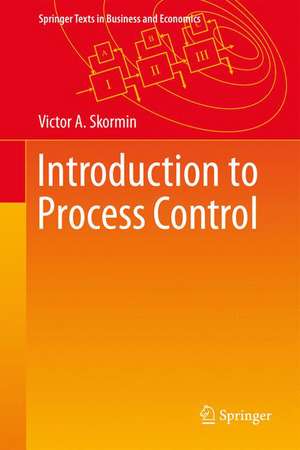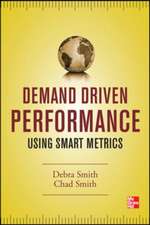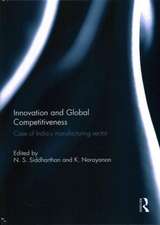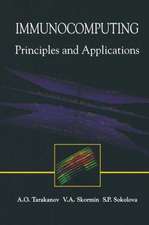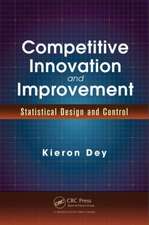Introduction to Process Control: Analysis, Mathematical Modeling, Control and Optimization: Springer Texts in Business and Economics
Autor Victor A. Skorminen Limba Engleză Hardback – 28 oct 2016
- Relevant mathematical methods, including random events, variables and processes, and their characteristics; estimation and confidence intervals; Bayes applications; correlation and regression analysis; statistical cluster analysis; and singular value decomposition for classification applications.
- Mathematical description of manufacturing processes, including static and dynamic models; model validation; confidence intervals for model parameters; principal component analysis; conventional and recursive least squares procedures; nonlinear least squares; and continuous-time, discrete-time, s-domain and Z-domain models.
- Control of manufacturing processes, including transfer function/transfer matrix models; state-variable models; methods of discrete-time classical control; state variable discrete-time control; state observers/estimators in control systems; methods of decoupling control; and methods of adaptive control.
- Methods and applications of system optimization, including unconstrained and constrained optimization; analytical and numerical optimization procedures; use of penalty functions; methods of linear programming; gradient methods; direct search methods; genetic optimization; methods and applications of dynamic programming; and applications to estimation, design, control, and planning.
| Toate formatele și edițiile | Preț | Express |
|---|---|---|
| Paperback (1) | 526.35 lei 6-8 săpt. | |
| Springer International Publishing – 24 iun 2018 | 526.35 lei 6-8 săpt. | |
| Hardback (1) | 589.02 lei 6-8 săpt. | |
| Springer International Publishing – 28 oct 2016 | 589.02 lei 6-8 săpt. |
Din seria Springer Texts in Business and Economics
- 17%
 Preț: 460.17 lei
Preț: 460.17 lei -
 Preț: 548.25 lei
Preț: 548.25 lei - 17%
 Preț: 490.71 lei
Preț: 490.71 lei - 13%
 Preț: 447.86 lei
Preț: 447.86 lei - 19%
 Preț: 509.83 lei
Preț: 509.83 lei -
 Preț: 360.02 lei
Preț: 360.02 lei -
 Preț: 374.88 lei
Preț: 374.88 lei - 17%
 Preț: 523.87 lei
Preț: 523.87 lei -
 Preț: 374.15 lei
Preț: 374.15 lei -
 Preț: 185.09 lei
Preț: 185.09 lei - 17%
 Preț: 522.65 lei
Preț: 522.65 lei - 19%
 Preț: 465.61 lei
Preț: 465.61 lei - 15%
 Preț: 642.51 lei
Preț: 642.51 lei - 18%
 Preț: 754.79 lei
Preț: 754.79 lei - 19%
 Preț: 534.44 lei
Preț: 534.44 lei -
 Preț: 360.47 lei
Preț: 360.47 lei -
 Preț: 359.93 lei
Preț: 359.93 lei - 17%
 Preț: 363.29 lei
Preț: 363.29 lei - 17%
 Preț: 363.98 lei
Preț: 363.98 lei -
 Preț: 473.41 lei
Preț: 473.41 lei -
 Preț: 361.12 lei
Preț: 361.12 lei - 8%
 Preț: 428.31 lei
Preț: 428.31 lei - 15%
 Preț: 479.55 lei
Preț: 479.55 lei - 13%
 Preț: 490.93 lei
Preț: 490.93 lei - 15%
 Preț: 650.55 lei
Preț: 650.55 lei -
 Preț: 382.19 lei
Preț: 382.19 lei - 15%
 Preț: 562.13 lei
Preț: 562.13 lei -
 Preț: 367.41 lei
Preț: 367.41 lei -
 Preț: 401.79 lei
Preț: 401.79 lei -
 Preț: 361.89 lei
Preț: 361.89 lei - 15%
 Preț: 562.31 lei
Preț: 562.31 lei - 17%
 Preț: 491.52 lei
Preț: 491.52 lei - 20%
 Preț: 819.24 lei
Preț: 819.24 lei - 15%
 Preț: 597.20 lei
Preț: 597.20 lei -
 Preț: 320.05 lei
Preț: 320.05 lei - 20%
 Preț: 694.03 lei
Preț: 694.03 lei - 20%
 Preț: 693.46 lei
Preț: 693.46 lei -
 Preț: 548.53 lei
Preț: 548.53 lei - 17%
 Preț: 459.67 lei
Preț: 459.67 lei - 17%
 Preț: 366.16 lei
Preț: 366.16 lei - 20%
 Preț: 693.82 lei
Preț: 693.82 lei -
 Preț: 555.90 lei
Preț: 555.90 lei - 9%
 Preț: 766.64 lei
Preț: 766.64 lei
Preț: 589.02 lei
Preț vechi: 692.96 lei
-15% Nou
Puncte Express: 884
Preț estimativ în valută:
112.72€ • 117.25$ • 93.06£
112.72€ • 117.25$ • 93.06£
Carte tipărită la comandă
Livrare economică 14-28 aprilie
Preluare comenzi: 021 569.72.76
Specificații
ISBN-13: 9783319422572
ISBN-10: 331942257X
Pagini: 270
Ilustrații: XVII, 254 p. 106 illus., 50 illus. in color.
Dimensiuni: 155 x 235 x 22 mm
Greutate: 0.56 kg
Ediția:1st ed. 2017
Editura: Springer International Publishing
Colecția Springer
Seria Springer Texts in Business and Economics
Locul publicării:Cham, Switzerland
ISBN-10: 331942257X
Pagini: 270
Ilustrații: XVII, 254 p. 106 illus., 50 illus. in color.
Dimensiuni: 155 x 235 x 22 mm
Greutate: 0.56 kg
Ediția:1st ed. 2017
Editura: Springer International Publishing
Colecția Springer
Seria Springer Texts in Business and Economics
Locul publicării:Cham, Switzerland
Cuprins
Statistical Methods and their Applications.- Mathematical Description of Manufacturing Processes.- Computer Control of Manufacturing Processes.- Methods and Models of Optimazation.
Notă biografică
Dr. Victor Skormin, Professor of Electrical and Computer Engineering at Binghamton University, was promoted to the rank of Distinguished Service Professor in 2006, the highest faculty rank in the SUNY system. This rank is given to a very small number of professors who make extraordinary contributions to the State University of New York. During his 29 years of service at Binghamton, Professor Skormin established the Control Systems curriculum, pioneered laser communication research, pioneered cyber security research, established strong lasting ties with researchers of the Air Force, initiated important international exchanges, hosted national and international dignitaries representing the NSF, the Pentagon, the USAF and the Russian Academy of Sciences. He graduated 22 PhD students, some of whom currently occupy positions of high visibility in industry. Dr. Skormin is known as an excellent lecturer and prolific educator who sets very high standards for his students. Over the years he received the SUNY Chancellor's Award for Excellence in Teaching (1990), University Award for Excellence in Graduate Teaching (1990), the IEEE Award "For Leadership in Establishing University Industry Links" (1991), the SUNY Chancellor's Award for Excellence in Research (2004), and Book of the Year Award for his book on IMMUNOCOMPUTING from the International Institute for Advanced Studies in Systems Research and Cybernetics, Baden-Baden, Germany (2004). He has been elected an International Member of the Russian Academy of Navigation and Motion Control Sciences (2002) and an Honorary Professor of the Kazakh National Technical University, Almaty, Kazakhstan (1999).
Textul de pe ultima copertă
This textbook is intended for an introductory graduate level on process control, taught in most engineering curricula. It focuses on the statistical techniques and methods of control and system optimization needed for the mathematical modeling, analysis, simulation, control and optimization of multivariable manufacturing processes. In four sections, it covers:
- Relevant mathematical methods, including random events, variables and processes, and their characteristics; estimation and confidence intervals; Bayes applications; correlation and regression analysis; statistical cluster analysis; and singular value decomposition for classification applications.
- Mathematical description of manufacturing processes, including static and dynamic models; model validation; confidence intervals for model parameters; principal component analysis; conventional and recursive least squares procedures; nonlinear least squares; and continuous-time, discrete-time, s-domain and Z-domain models.
- Control of manufacturing processes, including transfer function/transfer matrix models; state-variable models; methods of discrete-time classical control; state variable discrete-time control; state observers/estimators in control systems; methods of decoupling control; and methods of adaptive control.
- Methods and applications of system optimization, including unconstrained and constrained optimization; analytical and numerical optimization procedures; use of penalty functions; methods of linear programming; gradient methods; direct search methods; genetic optimization; methods and applications of dynamic programming; and applications to estimation, design, control, and planning.
Caracteristici
Suitable for graduate-level courses on any manufacturing process Author is a prominent teacher/researcher/consultant in the field Includes end-of-chapter problems
